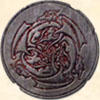Khazari
Khazari is a small land that sits astride the Silk Road. Like Semphar, it derives much of its wealth from the trade that crosses its borders. It is not as well located as Semphar, or as well organized, and so is much less powerful. Khazari has a long history of invasion, both by the nomad armies and Shou Lung. Its culture is a mix of Shou, Tabot?, Ra- Khati, and nomad beliefs.
Khazari is a small nation of mountain dwellers under the nominal command of a hereditary prince. The land is named after the long Khazari Valley, formed by the enfolding arms of the Katakoro Shan. The Silk Road runs through the center of the country, making Khazari a strategic territory for the caravan trade. These caravans provide Khazari with most of its wealth, since the land here is poor and resources are few.
The capital of Khazari is Skardu at the junction of the Shyok and Jumpa rivers. The capital is a modest city, symbolic of Prince Ogandi’s power. Although he is the ruler of the land, the prince has little control over most of the towns and fiefdoms. The towns are ruled by the governors, the fiefdoms by the knights. Once the ruling prince appointed the governors and gave knighthoods as rewards. Now, both of these positions are automatically handed down from father to son. Only rarely does the prince have the opportunity to alter the flow of succession. In addition to the knights and governors, the prince must also contend with the monks of the monasteries. Most of these follow the Path of Enlightenment. While not as intently single-minded as their brethren in Ra-Khati, the monks of Khazari are stubbornly independent. They see to their own affairs and refuse to submit to the rulings of the prince or any other lord.
Finally, there is Shou Lung. Khazari has been a part of Shou Lung in the past. Although the struggles with T’u Lung? have absorbed his attention, the Emperor of the Jade Throne has never abandoned his claim on Khazari. While he currently lacks the resources to reconquer this little nation, the Emperor does exert his influence over the Khazari. Prince Ogandi, along with many of the governors and knights, have Shou “advisors” to help them reach decisions— ones favorable to Shou Lung.
Because Khazari is so divided, it can only raise a small army on short notice. Too many of the lords are caught up in personal feuds, preventing an effective overall command or strategy. This is just as Shou Lung wants it— Khazari too weak to present a threat. Each lord or town can assemble a decent garrison, sufficient to impress even the most blood- thirsty bandits, but Khazari is not capable of fielding real armies.
Of course, the majority of people here are not lords or monks. They are simple farmers and tradesmen. The farmers grow barley and millet, and raise yaks and sheep. The tradesmen make goods to sell to the caravans, brightly dyed cloth and leather being most in demand. Other merchants make their living selling more mundane supplies to the passing merchants: grain, meat, firewood, and saddles. Because it is the custom of the monasteries to provide shelter (in exchange for a donation), there are few inns or caravansaries in the kingdom.
Khazari benefits and suffers because of its rugged borders. The mountains of the Katakoro Shan limit access to the land to a few small passes. These are easy to defend and the Khazari have built fortresses to protect these. However, the mountains also provide shelter to bandits, lured to the country by the wealth that travels the Silk Road. Because the lords mistrust each other, the government rarely assembles a force large enough to track down and exterminate the gangs. At best, each lord tries to protect the caravans as they move through his lands. Protection might mean an armed guard or a bribe to encourage the bandits to take their business elsewhere. Bribery is the method preferred by both bandits and lords. The bandits run fewer risks and the lords make up their costs by taxing the caravans. As a result, Khazari is considered an expensive and, unfortunately, necessary evil by the caravan masters. The only other routes from east to west are the long northern Spice Road and the Old iron Road. The Spice Road is cold and dangerous. The Old Iron Road is closed, the pass through the Katakoro Shan blocked by the kindly but fanatical citizens of Ra-Khati.
In addition to Skarou, there are several other towns in Khazari. The second largest is Alashan, located on the border of the steppe. At the northern end of the country is the town of Hsiliang?, a town of monasteries. There are four other great places of Khazari legend: Skardu, Manass, Taghla?, and Barkhul?.
''Khazari was one of the first countries to fall to the Horde, a stepping stone to their invasion of Shou Lung. An army, led by Yamun Khahan himself, defeated the garrison at Alashan, thereby opening the border to his troops. Prince Ogandi, knowing his people could not defeat the vast numbers of the Horde, quickly sued for peace. Upon the advice of Yamun’s advisor Koja, the khahan’s son, Jadaran, was made governor of Alashan. With the armies of the khahan occupied elsewhere, Prince Ogandi has set about reducing the power of his upstart lords and reclaiming the rule of Khazari once again. He is confident that someday the Tuigan overlords will be gone. When that happens, he will be ready to resume control.''
